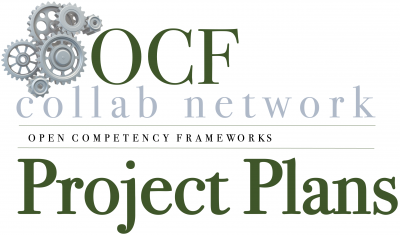OCF Collab Network:ocfcWork: Difference between revisions
From T3 Network Wiki
mNo edit summary |
mNo edit summary |
||
| Line 11: | Line 11: | ||
:::The Tool has been designed and implemented for configuration to support 1-to-n Projects. Each Project in an instance of the Tool can be configured with different: | :::The Tool has been designed and implemented for configuration to support 1-to-n Projects. Each Project in an instance of the Tool can be configured with different: | ||
::# | ::# organizations and their associate mapping personnel involved in the Project; | ||
::# set of mapping predicates defining the types of relationships that can be used in the Project’s mappings; | |||
::# set of abstract classes defining the entity type or types being mapped in the Project; | |||
::# schema files to be mapped for each organization involved in the Project mappings; and | |||
::# prescribed concept schemes (enumerations) used as values for properties in the schemas mapped in the Project. | |||
Revision as of 20:45, 20 October 2021
>> OCFCollab Home >> Project Plans
- All of the work of this network must be rooted in Use Cases that advance the objectives of one or more well-define Project Plans in service of the missions of the Network and the T3N2.
OCFC:PP-001 (Draft) DESM Configuration Dashboard Project Plan
Project Demographic Information
- Project Description
- This project plan (hereafter, Plan) defines work to be done in implementing a configuration dashboard for the Data Ecosystem Mapper (DESM) tool (hereafter, “Tool”) to facilitate the setup of the by schema mapping leads. A narrative document including wireframes for configuring the Tool for a particular mapping project (hereafter, “Project”) was developed as part of the work of OCF Collab Phase 2 in 2020 and is available here.
- Project Description
- The Tool has been designed and implemented for configuration to support 1-to-n Projects. Each Project in an instance of the Tool can be configured with different:
- organizations and their associate mapping personnel involved in the Project;
- set of mapping predicates defining the types of relationships that can be used in the Project’s mappings;
- set of abstract classes defining the entity type or types being mapped in the Project;
- schema files to be mapped for each organization involved in the Project mappings; and
- prescribed concept schemes (enumerations) used as values for properties in the schemas mapped in the Project.
- Use Case(s)
- Network Associations
- Project Leads
